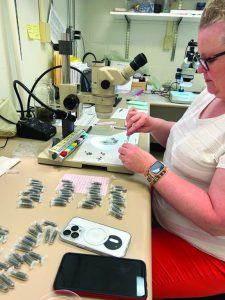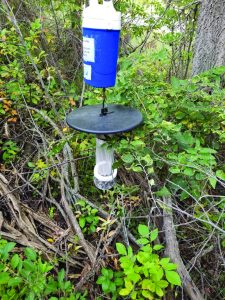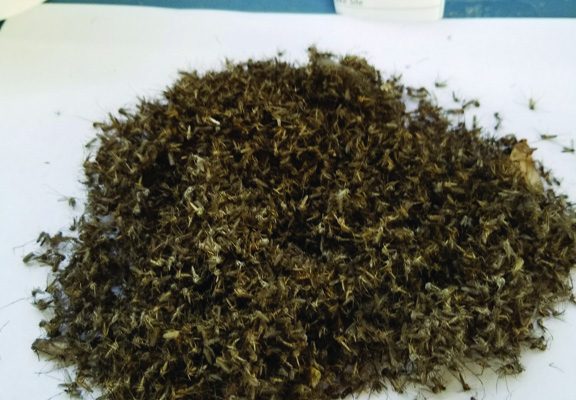Panhandle Public Health District (PPHD), along with the Nebraska Department of Health and Human Services (NDHHS), continues to monitor West Nile virus in the area, along with several other diseases caused by mosquitoes, through trapping methods that help provide the best possible opportunity to track these diseases. Surveillance of mosquitoes also helps determine where mosquitoes are most abundant, identifies mosquito breeding sites, and can track population and infection rates over time.
Center for Disease Control (CDC) Light Trap:
PPHD uses a CDC light trap which can be used to trap a wide range of mosquito species such as Aedes albopictus or the Culex species, the latter of which is known to contain West Nile virus. Light traps use dry ice that release carbon dioxide that attracts host-seeking female mosquitoes along with a light and fan that traps mosquitoes in a container to be shipped out to a lab for testing. Female mosquitoes bite humans as they need a blood meal to help them produce their eggs. Male mosquitoes do not bite people and animals.
Light traps are placed out generally at dusk, when mosquitoes are known to be most active, and are placed in areas that are typically seen as good mosquito breeding grounds such as areas with tree and brush cover, standing water, or low-lying areas that flood or can stay soggy. Most mosquitoes don’t travel far from their breeding grounds. Many species of mosquitoes travel only a few miles in their lifetime, so the traps can potentially catch a large number of mosquitoes at any given time in the evening.
Traps are left out overnight and mosquitoes are collected the next day and shipped to the Nebraska Public Health Laboratory in Lincoln. Mosquitoes collected from the traps are cooled for about 30-40 minutes to make them “inactive” and are transferred to petri dishes for shipping.


Mosquito Testing:
Jeff Hamik, Vector-Borne Disease Surveillance Coordinator with NDHHS, explains the process of testing the mosquitoes, “Collected mosquito samples are sent to the NDHHS Medical Entomology lab where samples are identified by morphology, counted, and mosquitoes pooled for pathogen testing.”
Jeff continues, “The pooled samples are then sent to the Nebraska Public Health Laboratory and tested by PCR (polymerase chain reaction) for several types of viruses including West Nile, St. Louis Encephalitis, and Western Equine Encephalitis.”
Starting in 2024, the lab began doing a limited number of expanded tests on some new viruses they would like to keep an eye on, Cache Valley, Jamestown Canyon, and La Crosse Encephalitis. All three of these diseases are spread by infected mosquitoes and can cause encephalitis, which is swelling of the brain. Like West Nile, these diseases sometimes can show no symptoms in a person, and it can be difficult to track these as some may never get reported to a physician.
Mosquito Bite Prevention:
The Panhandle area continually has mosquito pools test positive for West Nile and more pools test positive as the season progresses. Towards the end of July into August is peak time for people to potentially contract West Nile virus. The best way to protect yourself from contracting some of these serious diseases is to practice good prevention:
1. Use Insect Repellent: Apply EPA-registered insect repellents containing DEET, picaridin, IR3535, oil of lemon eucalyptus, para-menthane-diol, or 2-undecanone. Follow product instructions.
2. Wear Protective Clothing: Wear long-sleeved shirts, long pants, and socks when outdoors. Treat clothing and gear with permethrin.
3. Avoid Peak Mosquito Hours: Mosquitoes are most active during dawn and dusk. Limit outdoor activities during these times.
4. Eliminate Standing Water: Empty and clean birdbaths, gutters, planters, and any other items that can collect water. Mosquitoes lay eggs in standing water. You can request mosquito dunks from PPHD to help with water that is not easily drainable.
5. Use Mosquito Nets and Screens: Ensure windows and doors have screens to keep mosquitoes out. Use mosquito nets if sleeping outdoors or in areas without adequate screens.
6. Report Dead Birds: The public is also urged to report dead birds if they find them on their property. You can report birds online at: https://tinyurl.com/ycudv3tc.
To request further information on West Nile virus prevention, please visit www.pphd.ne.gov or call 308-487-3600 x108.

